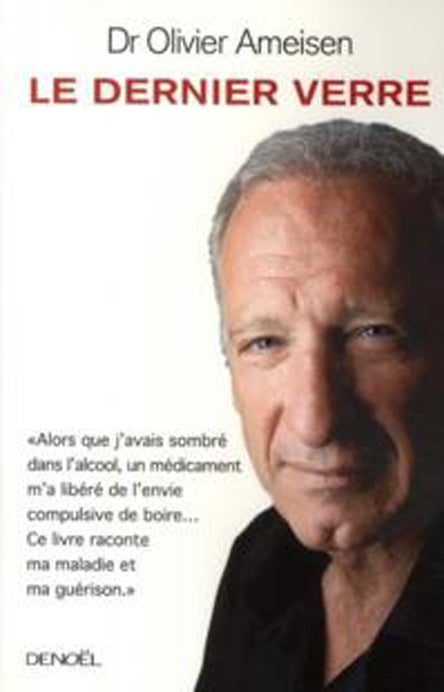Has this doctor discovered a cure for alcoholism?
Olivier Ameisen says he broke his habit with drugs, but the medical establishment has doubts

Alcoholism is a disease. Does that mean that it is treatable by drugs, like many other diseases? An eminent French doctor believes he has found not just a treatment for compulsive drinking but a miracle cure. He points in evidence to his star patient – himself.
The claims made by Dr Olivier Ameisen in a book which has jumped into the best-sellers' list in France, have created a huge stir in the European medical establishment. Fellow doctors in France and Switzerland – often under pressure from patients – have tested his methods and say they have been "astonished" by the results.
Other specialist doctors and anti-alcoholism campaigners are sceptical and even angry that Dr Ameisen – a leading cardiologist – should claim there is a simple pharmaceutical solution to what they insist is a complex physical, mental and social disease.
Nonetheless, anti-alcoholism clinics are being besieged by demands for treatment with the drug prescribed by Dr Ameisen in his book, Le Dernier Verre [The Last Glass]. An English translation will be published next year.
The French government agency which tests new drugs has taken the unusual step of deciding to examine the doctor's claims – unusual because the drug "discovered" is not new.
Baclofen is a cheap drug which has long been known as a cure for muscle spasms, especially among sufferers of cystic fibrosis or people who are partly or wholly paralysed. Dr Ameisen says his own experience and that of other patients suggests it can also be used to ease and then destroy an intolerable craving for alcohol. It is so effective, he claims, that alcoholics can go back to social drinking without fear of renewed dependency.
"Mine is the first case in which a course of medicine has completely suppressed alcohol addiction," Dr Ameisen said. "Now I can have a glass and it has no effect. Above all, I no longer have that irrepressible need to drink."
Another doctor who has tested it is Dr Renaud de Beaurepaire of the Paul-Guiraud hospital at Villejuif near Paris. "I prescribed it to two alcoholics who were at the end of the road," he said. "It was pretty miraculous."
Another alcoholism specialist, Philippe Michaud, is less convinced. "This book has really dropped us in it," he said. "We are being besieged by calls and letters from people who want the same treatment."
Dr Ameisen, 55, became an eminent heart specialist as a young man in France and then associate professor of cardiology at Cornell University in New York. In 1994 he began a lucrative private practice in Manhattan. Despite his success, he felt crushed by a sense of inadequacy. He writes in his book that he felt like "an impostor waiting to be unmasked". His means of relief was large doses of whisky and gin. "I detested the taste of alcohol but I needed its effects to exist in society," he says in Le Dernier Verre.
He spent nine months in alcohol-dependency clinics, treated with everything from hypnosis to acupuncture, to no avail. He gave up his American practice and returned to France.
In 2000, a friend sent him an article in The New York Times on how a course of baclofen, given to a patient with muscle problems, had cured his addiction to cocaine. Dr Ameisen read the literature and discovered that the drug was also known to have cured alcohol and cocaine addiction in laboratory rats. It had, however, never been used to treat human addiction.
In March 2002 he prescribed small daily doses of 5mg of baclofen to himself. "The first effects were a magical muscular relaxation and baby-like sleep," he said. He also found that he was no longer racked by a compelling necessity to drink.
After increasing the dose to 270mg a day, the doctor declared himself "cured". He still takes 50mg a day.
Alcoholism specialists, without dismissing the claims, have been irritated to find a doctor from another specialism making such sweeping claims. Xavier Laqueille, head of the St Anne hospital in Paris which treats addicts, said: "Alcoholism is a complex disease, in which both neuro-biological and psychosocial factors are entwined." Dr Michel Reynaud of the Paul-Brousse hospital in Paris said: "Encouraging people to think there is a miracle molecule is to completely misunderstand the nature of alcoholism and extremely irresponsible."
The French government agency which tests and approves drugs, L'Agence française de securité sanitaire des produits de santé (Afssaps), warns that baclofen is "not an anodyne drug" and can have adverse side-effects. Nonetheless, Fabienne Bartoli, assistant to Afssaps' head, says the agency will consider "how to organise clinical trials" which would put Dr Ameisen's claims to the test. No pharmaceutical company would sponsor such trials because baclofen has been out of copyright since 1997.
A limited experiment has already been conducted by Dr Pascal Garche of the Geneva University Hospital alcoholism unit. He gave 12 patients a course of baclofen. Seven showed remarkable signs of recovery. "I have never had reactions like this before," he said. "The book is going to set the cat among the pigeons." Dr Garche admitted that some patients withstand large doses of baclofen better than others. He has sought permission to extend his programme.
Dr Renaud de Beaurepaire of the Paul-Guiraud hospital is in no doubt. "Ameisen has made an extraordinary discovery," he said. "The whole world will thank him for it."
Subscribe to Independent Premium to bookmark this article
Want to bookmark your favourite articles and stories to read or reference later? Start your Independent Premium subscription today.

Join our commenting forum
Join thought-provoking conversations, follow other Independent readers and see their replies